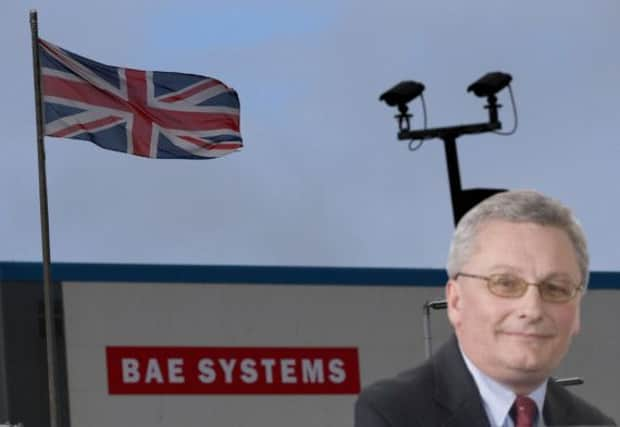BAE chief warns staff of independence risks


In his first major intervention Ian King, the chief executive of BAE Systems, which owns the Govan and Scotstoun yards on the Clyde, has written an internal blog to employees warning that the “stability and certainty” of the future of the industry in Scotland can only be guaranteed if Scotland votes No to independence.
Mr King was writing in response to an open letter this week from union officials warning of the consequences of independence.
Advertisement
Hide AdAdvertisement
Hide AdWith the Ministry of Defence as BAE’s biggest customer the UK government has made it clear that it would want its warships built in the remainder of the UK.
Apart from war time Royal Navy ships have all been built in British ports.
In his blog, Mr King pointed out that the new type 26 frigates are set to be built on the Clyde where the company is consolidating its business after closing down the yard in Portsmouth.
However, there has been speculation that it would reopen the Portsmouth yard if Scotland votes for independence.
Mr King said: “One topic of major interest discussed at the event was the forthcoming Scottish referendum in September, and I know that a number of you have concerns about what might happen in the event Scotland leaves the United Kingdom. To put this in context, we have around 3,500 employees working at various locations across Scotland.”
Emphasising that the company does not want to enter the debate, he went on: “We have been making our position known over the past couple of months. First, I do want to stress that this is a political and personal decision for the people of Scotland to determine whether or not they want independence from the rest of the UK and second I do not have a vote in the referendum and neither does the Company.”
However, he added: “But as far as our business is concerned, at present, we have certainty and stability in relation to those elements of our business which are located in Scotland, especially in Glasgow where we are consolidating our shipbuilding activities and investing in facilities for the future. This is based on an expectation that the Government will make their major production decision for the next generation Type 26 Frigate by the end of this year.”
And he warned: “If Scotland became independent, we would no longer have that certainty and stability. We would then have to talk to our major UK customer, the MOD, and jointly work out a plan for the future.”
He also raised concerns about employees pensions schemes.
Advertisement
Hide AdAdvertisement
Hide AdHe said: “The issue of pension schemes has been raised and is especially complex. If Scotland became independent and then subsequently joined the European Union, our pension schemes, along with many other UK company schemes, may be caught up in EU regulations relating to cross border pensions.
“The reality today is we can’t say how our pension schemes would be affected. There would be a number of possible outcomes and we would use our consultation processes to discuss the options.”
He concluded: “Scottish independence would raise a range of uncertainties. Beyond that, given the many decisions that would need to be taken by government in Westminster and in Scotland, we cannot be specific about the implications for our business, employees, suppliers or customers.
Uncertainty about the future is always unhelpful, and we will continue to see media attention on the Scottish referendum in the UK as we approach September.”
Opponents of independence said that the intervention highlighted the dangers of a Yes vote for Scotland.
Labour’s shadow defence minister and West Dunbartonshire MP Gemma Doyle said: “With around 3,500 employees in Scotland, this is a very important intervention from BAE. It’s clear that if we leave the UK then it would cost defence jobs in Scotland. This isn’t a risk worth taking.”
A Scottish Government source said: “It is clear that the Clyde is the only place for Type 26s to be built.
“However, the UK Government’s apparent inability to secure the future of Govan highlights the hypocrisy of the UK Government and the No campaign.
“The No campaign said a Yes vote threatened Govan, but the fact is that a plan for its closure is happening now – on Westminster’s watch.”